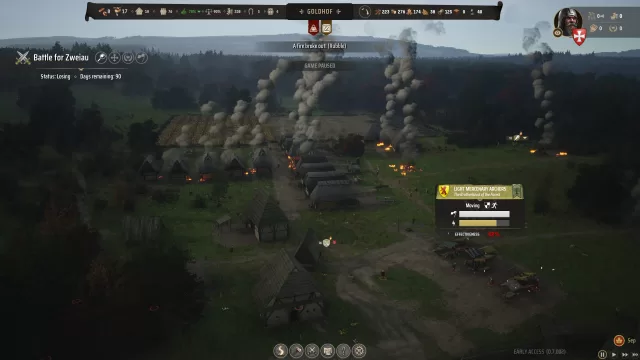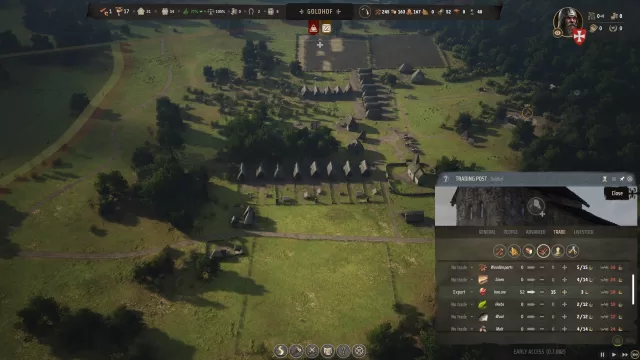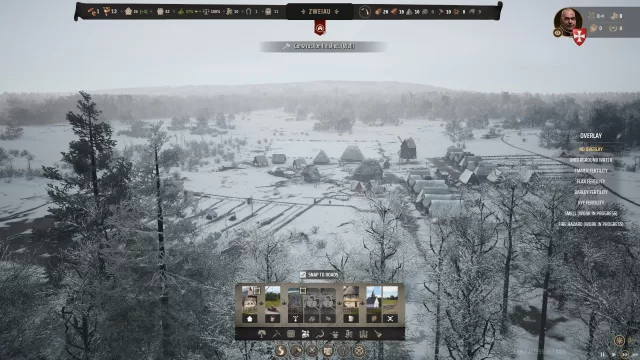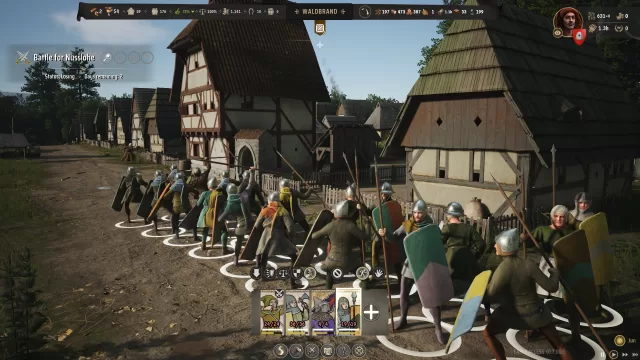Manor Lords Early Access Preview – Feudalism is Fun
City/village building economic and social simulators focused on survival are dotting the gaming landscape, and it seems that people can’t get enough of them. Everyone and their dog are making those games, driving the indie commercial averages into the serious green. Sometimes, the independent effort has the capital I, as is the case with Manor Lords, a one-man-show game that took seven years to materialize in the playable form.
If I were to dissect the meteoric early success of Manor Lords, which was and still is the most wish-listed game on Steam, I would start with its clever hybridization. By itself, the village-building aspect of the game is solid but not particularly innovative. Its sole unique aspect is visual authenticity, as it fully captures the muddy bleakness of medieval dwellings, where a rare bit of color comes only with the spring bloom. That representation, however faithful it may be, is only half of the story.
The fusion of simple and complex

The strategic and tactical parts, which come in parallel with the harvesting and other logistic efforts is the ZING that separates Manor Lords from most building-focused lookalikes out there. The argument that Total War games routinely do the same thing is moot since TW games forego the detailed, real-time economy for a grossly simplified turn-based system. In Manor Lords, everything is real, immediate, and super intertwined; The archer band you mobilized to defend the village from the bandits comes at the expense of the labor. If peasants fight, they can’t plow, and vice versa. With every granary those bandits set on fire, you’ll lose the precise amount of food stored there, down to the last grain. The seamless, organic unity between stationary and moving parts of this complex game is great, at least in theory. Since it just entered early access, many of the aspects exist only as placeholders.
Building on a healthy foundation

The Early Access version of Manor Lords doesn’t overflow with content, but the basic building blocks are here. And they work reasonably well. At the start, you’ll need to mobilize your initial batch of serfs into building a dwelling capable of sustaining itself. The village also needs to be attractive enough for more people to join, since natural procreation is not in the game (yet). Instead of individuals, Manor Lords utilizes families as the basic units for the logistical headcount. Families need housing, and will not join your village if it lacks a pre-fabricated house, even if it has plenty of food and other amenities, such as a church or tavern. In Manor Lords, beggars CAN be choosers.
So the basic dynamics are similar to Tropico games, with simulated seasons that weren’t an issue in the sunny Caribbean. You’ll need to balance the resource economy with people, attracting the number you’ll easily feed and keep warm, making sure you don’t end up with an influx of people in winter when there’s nothing to eat. Most of the food-related labor is seasonal. Sowing and harvesting happens during summer and fall, and the spring is ideal for gathering berries, a good food staple for poor inital village. All the gatherable food, like berries, but also wildlife, replenishes in time. However, the iron, clay, and stone, are finite. When you exhaust their local supply, you’ll have to resort to trading.
Advanced concepts as early placeholders

Reaching the milestones in growing your village grants you points for unlocking different branches inside the tech tree. Since those points are scarce, you’ll be motivated to specialize the economy. If you pick orchard, for example, you’ll need to wait for the next ding for basic armorsmithing. The stuff you lack will need importing, which you’ll need to counter-balance with exports because your merchants have major pricing disadvantages for some reason. The ratio will get better once you start manufacturing and selling complex stuff such as shoes, cloaks, or weapons.
So, you made the functional village, stockpiled some weapons, and repelled the initial bandit assault. What’s next, you ask? You can repeat the process on the nearest unclaimed territory, starting a fresh village from scratch. Or you can lay claim to the lands of your feudal competitor and start pounding the drums of war. Leading the troops in the field is still in the early phase, so expect a ton of bugs and weird behavior, from both your lads and foes. The tactical module is very similar to Total War games, but Manor Lords needs much more work for that comparison to stop being mostly theoretical.
The same goes for diplomacy and other advanced stuff, such as your feudal manor. Your lordly abode is a modular complex, consisting of a “castle” inside a walled compound, surrounded by watchtowers. Currently, it’s placeholdery as hell, since you have access only to the very few, initial building options.
Rocky road to the final form

Tropico but with predominantly mud color all around, with directed violence as a bonus. And some diplomacy. That would be pretty lazy observation which ignores the immense potential of Manor Lords. The question is, how long will it take to realize it? This is an infinitely more complex game compared to other one-man wonders like Stardew Valley, which took five years to manifest.
The lone hero of Slavic Magic studio already invested seven years in Manor Lords. If he doesn’t hire help, it could easily take another seven. Would you care for it in 2031 and beyond? It would suck major cannonballs for this game to become a neverending story, especially since the developer can now afford to employ a marching band atop all the developmental assistance he needs. Let’s hope he puts his business in overdrive and doesn’t waste the good momentum of the early access version. And, more importantly, the goodwill of the fans.
Highs
- The seamless blend of micro-logistics and grand strategy, with all the stages in between.
- Awesome visuals that present medieval times in a realistic, non-flattering manner and textures.
Lows
- Most of the advanced concepts are still in the early, placeholder phase.
- Repeatedly building the village from scratch in claimed territories is tiresome.

